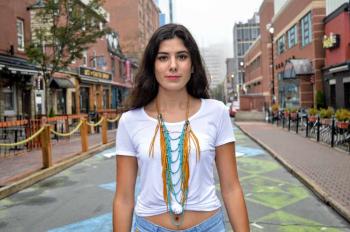Image Caption
Audio
By Shari Narine
Windspeaker Contributor
EDMONTON
(Attached is an interview with Rebecca Thomas by Dustin McGladrey of CFWE-FM)
Rebecca Thomas is excited about being one of four featured Indigenous poets at Eskonahkwahk on April 19. This marks the first time in 12 years the Edmonton Poetry Festival has set aside an evening for Indigenous spoken word.
“This is all unceded Indigenous territory, so I think it’s so very important to honour that especially in things like Canada 150 where there’s this notion that Canada is only 150 years old. But we, as Indigenous peoples, have been here for thousands of years. It’s really important to honour and acknowledge that,” said Thomas.
Rayanne Doucet, executive director for the Edmonton Poetry Festival, agrees.
“It seemed to make more sense to us to have an evening celebrating the Indigenous community rather than the colonization of Canada,” she said.
Indigenous poets have regularly been among the 50 or more participants in the Edmonton Poetry Festival, spread throughout the eight-day event. But this year to mark Canada’s 150th anniversary, the festival decided to host Eskonahkwahk and also do advertising in Cree.
Thomas is Halifax’s M’ikmaq poet laureate and according to Eskonahkwahk’s promotion, she “delivers melodic, witty and damning truths.”
“I’m hesitant to call myself a poet. I’d rather be a change maker, who happens to use poetry,” said Thomas, who has a theatre background. As a spoken word artist, her poetry is written for performance.
“It’s very focused on Indigenous kind of perspectives and speaking of bias. It’s important for me that non-Native people hear my poetry and go, ‘Huh. I never really thought about it like that before.’”
Thomas grew up off-reserve and says the history lessons she received in school were one-sided, told only from the colonial point-of-view. There is a value to non-Indigenous people attending an event like Eskonahkwahk, she says.
“I think in a lot of art that gets told, often Indigenous perspective and narrative is left out. You know, you hear Indigenous stories, but you don’t hear them from Indigenous people,” she said. “I think it’s so important that non-Native people hear Native stories and Native history from Native people.”
Thomas, who works full time delivering Indigenous supports in post-secondary in Nova Scotia, has been doing spoken word for four years. She uses her vacation time to travel to poetry festivals. The invitation to attend Edmonton’s festival was appealing because her work out west has been limited and the history on the Plains is different from the history on the east coast.
“Different nations, different history, different experience and so I would really love to tell an east coast Abenaki kind of style story,” she said.
Joining Thomas for the evening, which takes place at Latitude 53 art gallery, are Liz Howard, Gregory Scofield and Marilyn Dumont. The event will be hosted by Anna Marie Sewell.
Art work by Lana Whiskeyjack will also be showcased throughout the evening.
The event begins at 7:30 p.m. on Wednesday, April 19.
Doucet notes that the poets who are featured during Eskonahkwahk will also be performing throughout the festival.
“We lack such understanding of the culture of the (Indigenous) people. We don’t get enough of it in school, in our education. We don’t get enough of it just in our everyday life. For me, personally, this is an opportunity to see Indigenous artists or other Indigenous professionals bring a new light to that culture we’re not always exposed to in our everyday life,” said Doucet.
Check out http://www.edmontonpoetryfestival.com/

